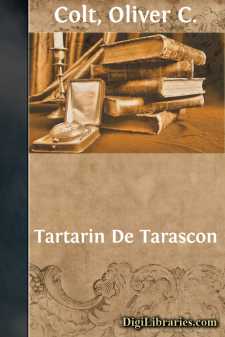Categories
- Antiques & Collectibles 13
- Architecture 36
- Art 48
- Bibles 22
- Biography & Autobiography 813
- Body, Mind & Spirit 142
- Business & Economics 28
- Children's Books 17
- Children's Fiction 14
- Computers 4
- Cooking 94
- Crafts & Hobbies 4
- Drama 346
- Education 46
- Family & Relationships 57
- Fiction 11829
- Games 19
- Gardening 17
- Health & Fitness 34
- History 1377
- House & Home 1
- Humor 147
- Juvenile Fiction 1873
- Juvenile Nonfiction 202
- Language Arts & Disciplines 88
- Law 16
- Literary Collections 686
- Literary Criticism 179
- Mathematics 13
- Medical 41
- Music 40
- Nature 179
- Non-Classifiable 1768
- Performing Arts 7
- Periodicals 1453
- Philosophy 64
- Photography 2
- Poetry 896
- Political Science 203
- Psychology 42
- Reference 154
- Religion 513
- Science 126
- Self-Help 84
- Social Science 81
- Sports & Recreation 34
- Study Aids 3
- Technology & Engineering 59
- Transportation 23
- Travel 463
- True Crime 29
Tartarin De Tarascon
by: Oliver C. Colt
Categories:
Description:
Excerpt
Introduction.
The tale of Tartarin de Tarascon was written by Alphonse Daudet in 1872, and was one of the many works which he produced. In it he pokes gentle fun at a type of Frenchman who comes from the Midi, the area where he himself was born. Tartarin has characteristics which may remind the English-speaking reader of Toad of Toad Hall, a boastful braggart, easily deceived, but good-hearted au fond.
The world he inhabits is, of course, very different from ours. There is no radio or television, the motor car is no more than a plaything for the rich. There is only the beginnings of a telephone system. Much sea transport is still by sailing ship and the idea of mass air travel is in the realm of science-fiction. France lost the Franco-Prussian war at the battle of Sedan in 1870, which accounts for the flood of refugees from Alsasce. She had also, in the 19th century rush to carve up the African continent, seized among other places, Algeria, which she held in subjection by force of arms. So-called Big Game Hunters were regarded with some admiration, and indeed it was a much more perilous activity than it is today, when high power repeating rifles with telescopic sights make motor-borne "Sportsmen" little more than butchers.
Daudet's humour is on the whole inoffensive, but anti-semitism was rife in certain circles in France. It was the era of the Dreyfus scandal, and he indulges in one or two tasteless gibes at the expense of the Jews, which I have suppressed or at least amended. He also has a passage which might well offend the delicate susceptabilities of the less tolerant believers in Islam, although to anyone with a nodding acquaintance with the tents of that faith, the incident is so far-fetched as to neutralise "The willing suspension of disbelief" I have therefore decided to eliminate it from this version of the story. It is not very amusing and is no great loss.
Although Daudet's humour is in the main kindly, he does not spare the French colonial administration of the time. His treatment of the subject is acidly satirical. It may be said that Daudet seems to know little about firearms, less about lions and nothing about camels, but he is not striving for verisimilitude. After all, the adventures of James Bond do not mirror the reality of international espionage, nor do the exploits of Bertie Wooster and Jeeves truely reflect life in the upper echelons of British society.
This is not a schoolroom exercise in translation. It might be more accurately described as a version in English. I have not tampered with the story line nor made any changes in the events related, but where I thought it necessary I have not shrunk from altering the words and phrases used in the original to describe them. All translation must be a matter of paraphrase. What sounds well in one language may sound ridiculous if translated literally into another, and it is for the translator to judge how far this process of paraphrase may be carried.
I have attempted to produce a text which will entertain the average reader....


